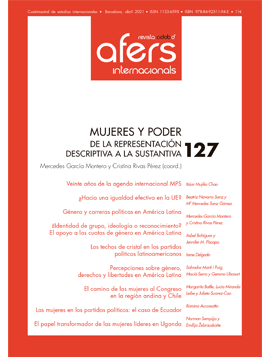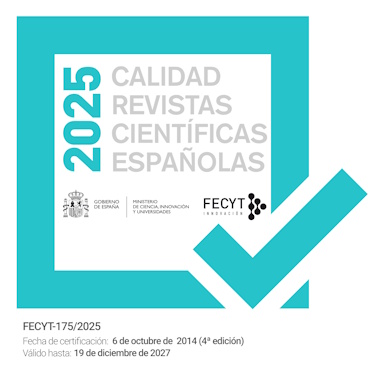Group identity, ideology or recognition? Lawmakers’ support for gender quotas in Latin America
Keywords:
gender quotas, elites, gender inequality, Latin America, women MPsAbstract
Revista CIDOB d’Afers Internacionals, n.º 127
Quadrimestral (January-April)
ISSN:1133-6595
E-ISSN:2013-035X
DOI: doi.org/10.24241/rcai.2021.127.1.95
The adoption and improvement of gender quota laws depend on political elites, but which lawmakers believe quotas are necessary? To answer this question, we use data from surveys of the elites in 13 Latin American parliaments. The findings are unexpected, both at national and party levels: the strength of already-existing quotas does not perfectly correlate with support for quotas, and the attitudes of political parties on the matter are not consistent. At the individual level, three pro-quota groups are identified: women, the left, and those who recognise the problem of gender inequality. When comparing the significance of these three groups, it is observed that women lawmakers will always be more supportive than men, regardless of ideology and the degree of recognition of the problem.
References
Allen, Peter y Cutts, David. «Exploring sex differences in attitudes towards the descriptive and substantive representation of women». The British Journal of Politics and International Relations, vol. 18, n.° 4 (2016), p. 912-929.
Annesley, Claire; Beckwith, Karen y Franceschet, Susan. Cabinets, Ministers, and Gender. Nueva York: Oxford University Press, 2019.
Baldez, Lisa. «Elected Bodies: The Gender Quota Law for Legislative Candidates in Mexico». Legislative Studies Quarterly, vol. 29, n.° 2 (2004), p. 231-258.
Barnes, Tiffany y Córdova, Abby. «Making Space for Women: Explaining Citizen Support for Legislative Gender Quotas in Latin America». The Journal of
Politics, vol. 78, n.° 3 (2016), p. 670-686.
Batista Pereira, Frederico y Porto, Nathália. «Gender Attitudes and Public Opinion towards Electoral Gender Quotas in Brazil». Political Psychology, vol. 41, n.° 5 (2020), p. 887-899.
Beauregard, Katrine. «Partisanship and the gender gap: support for gender quotas in Australia». Australian Journal of Political Science, vol. 53, n.° 3 (2018), p. 290-319.
Clayton, Amanda; O’Brien, Diana y Piscopo, Jennifer M. «All Male Panels? Representation and Democratic Legitimacy». American Journal of Political Science, vol. 63, n.° 1 (2019), p. 113-129.
Dahlerup, Drude. «Gender Equality as a Closed Case: A Survey among the Members of the 2015 Danish Parliament». Scandanavian Political Studies, vol. 41, n.° 2 (2018), p.188-209.
Dahlerup, Drude y Freidenvall, Lenita. «Quotas as a ‘fast track’ to equal representation for women: Why Scandinavia is no longer the model». International Feminist Journal of Politics, vol. 7, n.° 1 (2005), p. 26-48.
Dolan, Kathleen y Lynch, Timothy. «Making the connection? Attitudes about Women in Politics and Voting for Women Candidates». Politics, Groups, and Identities, vol.3, n.° 1 (2015), p. 111-132.
Dolan, Kathleen y Sanbonmatsu, Kira. «Gender Stereotypes and Attitudes toward Gender Balance in Government». American Politics Research, vol. 37, n.° 3 (2009), p. 409-428.
Dubrow, Joshua. «The importance of party ideology: Explaining parliamentarian support for political party gender quotas in Eastern Europe». Party Politics, vol. 17, n.° 5 (2010), p. 561-579.
Espírito-Santo, Ana. «Citizens’ attitudes towards descriptive representation: The case of women in Portugal». European Journal of Women’s Studies, vol. 23, n.° 1 (2016), p. 43-59.
Freidenberg, Flavia y Araúz, Harry Brown. «La representación política de las mujeres en Panamá: una propuesta para superar el dilema de coordinación entre las primarias y la paridad.» Derecho Electoral, vol. 27, n.° 1 (2019), p. 5-25.
Funk, Kendall D.; Hinojosa, Magda y Piscopo, Jennifer M. «Still Left Behind: Gender, Political Parties, and Latin America’s Pink Tide». Social Politics, vol. 24, n.° 4 (2017), p. 399-424.
Hinojosa, Magda; Piscopo, Jennifer M.; Siavelis, Peter y Thomas, Gwynn. «Les- sons from a Late Adopter: Chile’s Electoral Reforms and Women’s Representation». Congreso Mundial de la International Political Science Association, paper, Brisbane, Australia, (22-26 de Julio de 2018).
Htun, Malay y Jones, Mark P. «Electoral Quotas and Women’s Leadership in Latin America», en: Craske, Nikki y Molyneux, Maxine (eds.). Gender and the Politics of Rights and Democracy in Latin America. Nueva York: Palgrave, 2002, p. 32-56.
Htun, Mala y Power, Timothy. «Gender, Parties, and Support for Equal Rights in the Brazilian Congress». Latin American Politics and Society, vol. 48, n.° 4 (2006), p. 83-104.
Hughes, Melanie; Paxton, Pamela; Clayton, Amanda y Zetterberg, Pär. «Global Gender Quota Adoption, Implementation, and Reform». Comparative Poli- tics, vol. 51, n.° 2 (2019), p. 219-238.
Infobae. «Diputados aprobó la ley de paridad de género en listas electorales». Info- bae.com, (11 de noviembre de 2017) (en línea) [Fecha de consulta: 22.06.2020] https://www.infobae.com/politica/2017/11/23/diputados-aprobo-la-ley-de-pa- ridad-de-genero-en-listas-electorales/
Johnson, Niki. «Marginalization of Women and Male Privilege in Political Re- presentation in Uruguay», en: Schwindt-Bayer, Leslie (ed.). Gender and Re- presentation in Latin America. Nueva York: Oxford University Press, 2018, p. 175-195.
Josefsson, Cecilia. «How candidate selection structures and genders political ambition: illustrations from Uruguay». European Journal of Politics and Gen- der, vol. 3, n.° 1 (2020), p. 61-78.
Keenan, Lisa y McElroy, Gail. «Who supports gender quotas in Ireland?». Irish Political Studies, vol.32, n.° 3 (2017), p. 382-403.
Krook, Mona Lena. Quotas for Women in Politics. Nueva York: Oxford University Press, 2009.
Meier, Petra. «Paradoxes in the Meanings of Quotas in Belgium», en: Franceschet, Susan, Krook; Mona Lena y Piscopo, Jennifer M. (eds.). The Impact of Gender Quotas. Nueva York: Oxford University Press, 2012, p. 157-172.
Möhring, Katja y Teney, Céline. «Equality prescribed? Contextual determinants of citizens’ support for gender boardroom quotas across Europe». Comparative European Politics, vol. 17, n.° 6 (2019), p. 1-30.
Morgan, Jana y Buice, Melissa. «Latin American Attitudes toward Women in Politics: The Influence of Elite Cues, Female Advancement, and Individual Characteristics». American Political Science Review, vol. 107, n.° 4 (2013), p. 644-662.
O’Brien, Diana y Piscopo, Jennifer M. «Electing Women to National Legislatures», en: Alexander, Amy; Jalalzai, Farida y Bolzendahl, Catherine (eds.). Measuring Women’s Political Empowerment across the Globe. Londres: Palgrave Macmillan, 2018, p. 139-163.
Pastor Yuste, Raquel y Iglesias-Onofrio, Marcela. «¿Solo importa el género? Análisis de las percepciones de los parlamentarios españoles sobre la representación política descriptiva y sustantiva». Política y Sociedad, vol. 55, n.° 1 (2018), p. 135-159.













